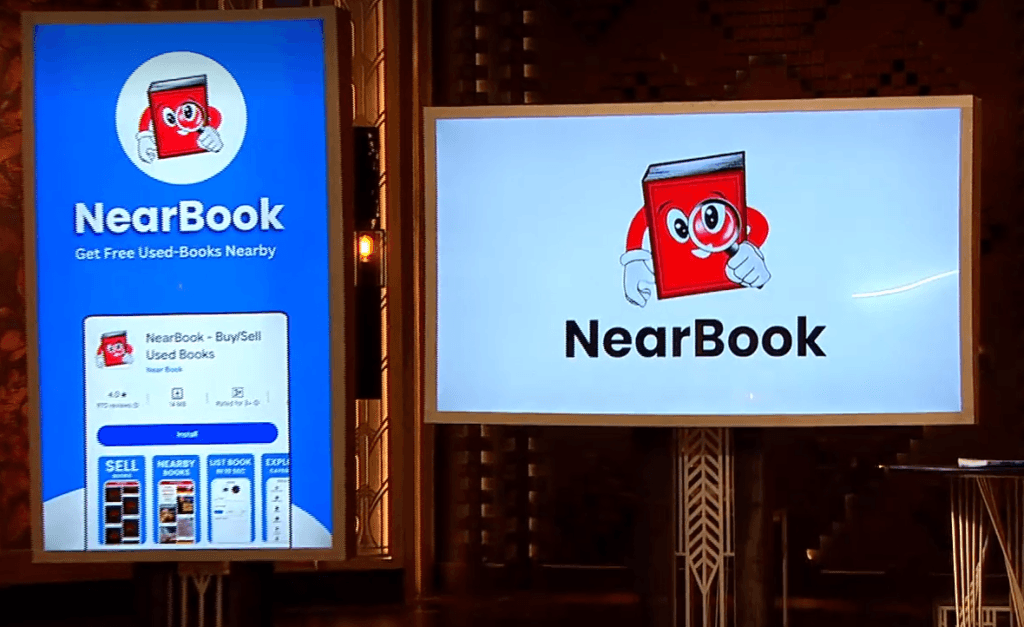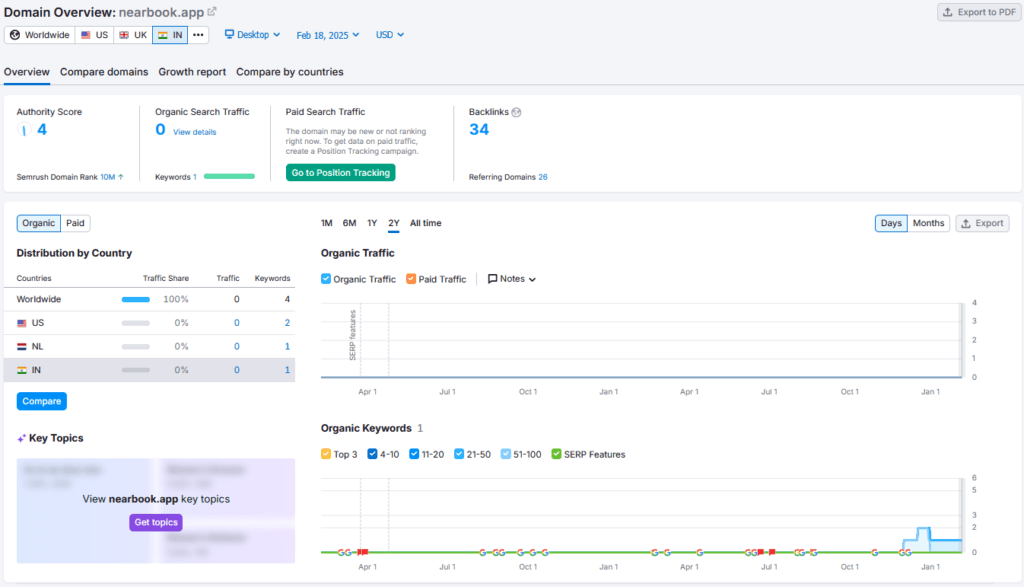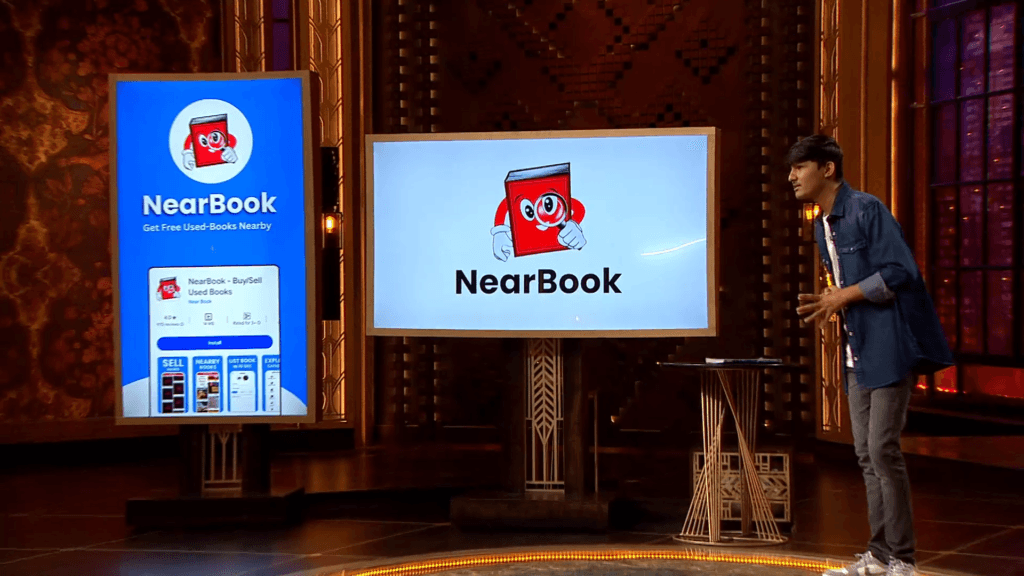NearBook Shark Tank India Episode Review
Website Information
- Website:- NearBook
- Build on JavaScript libraries- Goober, prettyPhoto, OWL Carousel, Modernizr 2.8.3, jQuery 1.11.1
- Poor SEO Performance, SEO improvement is needed.
- ORGANIC TRAFFIC: 0 visitors per month.
Founders
- NearBook was founded by Sanjay Kumar, a 20-year-old entrepreneur from a small town in Rajasthan.
- Inspired by his father’s entrepreneurial struggles, Sanjay is determined to make his business succeed within a six-month deadline set by his father.
- His father’s past attempts at various ventures, including acting and farming, have instilled in Sanjay both the challenges of entrepreneurship and the importance of perseverance.

Brand Overview
- NearBook is an online platform designed for buying, selling, and renting used books.
- The startup aims to connect book lovers and promote reading by making books more accessible and affordable.
- The platform allows users to list their used books, fostering a community of readers who can exchange literature easily.
- NearBook seeks to cultivate a culture of reading while providing a sustainable solution for book circulation.
Shark Tank India Appearance and Ask
- Sanjay pitched NearBook on Shark Tank India Season 4, Episode 31, seeking ₹40 lakh in exchange for 20% equity, valuing the company at ₹2 crore.
- He highlighted the platform’s potential to serve as a marketplace for used books and expressed his vision for future revenue generation through advertising.
Season and Episode Air Date
- Season: 04
- Episode: 31
- Episode Air Date: Monday, 17 February 2025
Product Overview
- NearBook operates as an online marketplace that facilitates the buying, selling, and renting of books.
- The platform offers thousands of titles across various genres, formats, and languages.
- Users can easily list their used books for sale or rent, making it a one-stop solution for readers looking for affordable options.
- The app aims to simplify book exchanges while promoting a strong community of readers.
Investor Reactions
- The Sharks had mixed reactions during Sanjay’s pitch.
- Anupam Mittal praised Sanjay’s grit but initially backed out due to concerns about the classifieds industry being dominated by larger players like Amazon.
- Namita Thapar echoed these concerns, suggesting that there might not be enough market demand for classifieds anymore.
- Vineeta Singh disagreed with this assessment but ultimately chose not to invest.
- Ritesh Agarwal offered mentorship but no financial backing. Kunal Bahl also decided against investing due to trust issues.
Customer Engagement Philosophy
- NearBook is committed to fostering a community of readers by making literature accessible and affordable.
- The brand emphasizes engagement through social media platforms where users can share their reading experiences and book recommendations.
- By creating an interactive platform, NearBook aims to build loyalty among its users.
Product Highlights
- User-Friendly Platform: NearBook provides an easy-to-navigate app for buying, selling, and renting used books.
- Diverse Selection: Users can access thousands of books across various genres and languages.
- Community Focus: The platform encourages interaction among users, promoting a culture of reading and sharing.
- Sustainable Solution: By facilitating the exchange of used books, NearBook contributes to environmental sustainability.
Future Vision
- With the investment from Anupam Mittal, NearBook aims to expand its reach and enhance its platform features.
- Sanjay Kumar envisions growing NearBook into a leading marketplace for used books in India while exploring opportunities for international expansion in the future.
Deal Finalized or Not
- Initially, all five Sharks expressed reservations about investing in NearBook due to concerns over market viability and competition.
- However, just as Sanjay was about to leave without a deal, Anupam Mittal offered him the ₹40 lakh he requested for 20% equity, recognizing the young entrepreneur’s determination and potential.
- NearBook successfully secured a deal on Shark Tank India, receiving ₹40 lakh for 20% equity at a valuation of ₹2 crore.
- This investment not only provides financial support but also valuable mentorship from Anupam Mittal as Sanjay embarks on his entrepreneurial journey.

| Category | Details |
|---|---|
| Website Information | Website: NearBook |
| Built On: JavaScript libraries – Goober, prettyPhoto, OWL Carousel, Modernizr 2.8.3, jQuery 1.11.1 | |
| SEO Performance: Poor SEO, requires improvement | |
| Organic Traffic: 0 visitors per month | |
| Founders | Founder: Sanjay Kumar |
| Background: 20-year-old entrepreneur from Rajasthan | |
| Inspiration: Motivated by his father’s entrepreneurial struggles | |
| Challenge: Aims to make the business successful within six months | |
| Brand Overview | Concept: Online platform for buying, selling, and renting used books |
| Mission: Promote reading by making books accessible and affordable | |
| Key Feature: Users can list used books for sale or rent | |
| Shark Tank India Appearance | Season & Episode: Season 4, Episode 31 |
| Air Date: Monday, 17 February 2025 | |
| Investment Ask: ₹40 lakh for 20% equity (₹2 crore valuation) | |
| Pitch Focus: Marketplace for used books with revenue potential through advertising | |
| Product Overview | Platform: Online marketplace for buying, selling, and renting books |
| Book Availability: Thousands of titles across genres, formats, and languages | |
| User Experience: Easy listing and browsing of books | |
| Community Engagement: Encourages book exchanges among readers | |
| Investor Reactions | Anupam Mittal: Praised Sanjay’s determination but was hesitant due to market competition |
| Namita Thapar: Concerned about the demand for book classifieds | |
| Vineeta Singh: Disagreed with concerns but did not invest | |
| Ritesh Agarwal: Offered mentorship but no funding | |
| Kunal Bahl: Opted out due to trust issues | |
| Customer Engagement Philosophy | Focus: Community-driven approach to reading |
| Engagement Strategies: Active social media presence for user interaction | |
| Product Highlights | User-Friendly: Simple and efficient platform for book transactions |
| Diverse Selection: Books in multiple genres and languages | |
| Community-Oriented: Encourages book-sharing culture | |
| Sustainability: Promotes eco-friendly book circulation | |
| Future Vision | Goal: Expand reach and enhance platform features |
| Long-Term Plan: Become a leading marketplace for used books in India with potential global expansion | |
| Deal Finalized? | Outcome: Initially no investment, but Anupam Mittal offered ₹40 lakh for 20% equity |
| Final Deal: ₹40 lakh investment at ₹2 crore valuation | |
| Business Potential in India | Second-Hand Book Market Growth: $781.04 million (2023) to $1411.93 million (2032) at 6.80% CAGR |
| Print Book Market Value (2019-20): ₹720.6 billion (~$8.8 billion) | |
| Growth Drivers: Online penetration, affordability, sustainability, and preference for physical books | |
| Total Addressable Market (TAM) | Target Audience: Students, budget-conscious readers |
| Market Share: USD 731.80 million (2024) and growing | |
| Competition: Amazon, Flipkart, and other online platforms | |
| Ideal Target Audience and Demographics | Age Group: 18-35 years |
| Income Level: Middle-income individuals, students | |
| Geographic Focus: Major cities – Delhi, Mumbai, Bangalore | |
| Marketing Strategy | Digital Marketing: Focus on social media (Instagram, Facebook) |
| Content Marketing: Blogs on book-related topics | |
| Community Engagement: Partnerships with colleges and universities | |
| Content & Digital Marketing Strategy | SEO Focus: Improve organic traffic from 0 visitors |
| Targeted Ads: Social media advertising for student and book-lover audiences | |
| Distribution Strategy | Online Platform: Improve UX for better transactions |
| Partnerships: Local bookstores and libraries for drop-off points | |
| Advantages | Affordability: Cheaper than buying new books |
| Sustainability: Encourages book reuse | |
| Community Building: Reader engagement and interaction | |
| Challenges | Competition: Presence of dominant players like Amazon |
| Logistics: Managing book deliveries efficiently | |
| Awareness: Overcoming stigma against used books | |
| Reasons for Success | Growing Demand: Market expansion and affordability factor |
| Strong Value Proposition: Sustainable and cost-effective | |
| Mitigation Strategies | Customer Feedback: Implement review and response system |
| Partnerships: Collaborate with credible organizations | |
| Awareness Campaigns: Educate users about second-hand books | |
| Future Business Roadmap | Short-Term (1 Year): SEO improvement and marketing boost |
| Mid-Term (2-3 Years): Expand into e-books and audiobooks | |
| Long-Term (4-5 Years): Become India’s leading second-hand book platform and expand globally | |
| Valuation Increase Strategies | Innovation: Enhance platform features |
| Brand Growth: Leverage social media for awareness | |
| Strategic Partnerships: Expand market reach through collaborations |
NearBook Shark Tank India Business Plan

Business Potential in India
- Market Size: The Indian second-hand books market is projected to grow from $781.04 million in 2023 to an estimated $1411.93 million by 2032, reflecting a compound annual growth rate (CAGR) of 6.80% from 2024 to 2031.
- Overall Book Market: India’s print book market was estimated at a valuation of 720.6 billion rupees (US$8.8 billion) in 2019-2020.
- Growth Drivers: The market is driven by increasing online penetration, the affordability of second-hand books, cultural shifts towards sustainability, and the enduring appeal of physical books amidst digitalization.
Total Addressable Market (TAM)
- Target Audience: The TAM includes students, avid readers, and budget-conscious individuals seeking affordable books.
- Market Share: The India Second Hand Book market had a market share of USD 731.80 million in 2024 and is projected to grow.
- Online Platforms: Online platforms like Amazon, Flipkart, and specialized websites have expanded accessibility, offering vast selections, convenient browsing, and user-friendly purchasing processes for second-hand books.
Ideal Target Audience and Demographics
- Age Group: Primarily targeting students and young professionals aged 18-35 years.
- Income Level: Students and middle-income individuals seeking affordable reading options.
- Geographic Focus: Major metropolitan areas like Delhi, Mumbai, and Bangalore, which lead in market growth due to the high demand for educational and recreational reading materials and well-established market infrastructures.
Marketing Strategy
- Digital Marketing: Utilize social media platforms (Instagram, Facebook) to target students and young adults.
- Content Marketing: Create blog posts and articles on the benefits of buying used books, reading lists, and study tips.
- Community Engagement: Partner with local colleges and universities to promote NearBook among students.
Content and Digital Marketing Strategy
- SEO Improvement: Currently, NearBook has an organic traffic count of 0 visitors per month, necessitating a comprehensive SEO strategy to enhance visibility.
- Targeted Ads: Run targeted ads on social media platforms to reach students and book lovers in specific geographic areas.
Distribution Strategy
- Online Platform: Focus on enhancing the user experience on the NearBook website to facilitate easy buying and selling.
- Partnerships: Collaborate with local bookstores and libraries to establish drop-off and pick-up points for books.
Advantages
- Affordability: Offers a cost-effective alternative to buying new books.
- Sustainability: Promotes environmental sustainability by encouraging the reuse of books.
- Community Building: Fosters a community of readers who can connect and share their love for books.
Challenges
- Competition: Faces competition from established online marketplaces like Amazon and Flipkart.
- Logistics: Managing the logistics of buying, selling, and delivering used books can be challenging.
- Limited Awareness: Overcoming negative perceptions about used books.
Reasons for Success
- Growing Demand: The second-hand books market is experiencing growth due to increasing online penetration and affordability.
- Strong Value Proposition: NearBook offers a compelling value proposition by providing affordable books and promoting sustainability.
Mitigation Strategies
- Customer Feedback: Implement a system for collecting and responding to customer feedback.
- Partnerships: Collaborate with local organizations to build trust and credibility.
- Awareness Campaigns: Launch campaigns aimed at educating the market and overcoming negative perceptions.
Future Business Roadmap
Short-Term Goals (1 Year):
- Improve website SEO to increase organic traffic significantly.
- Launch targeted marketing campaigns focusing on students and young adults.
Mid-Term Goals (2-3 Years):
- Expand the platform to include e-books and audiobooks.
- Establish partnerships with colleges and universities across India.
Long-Term Goals (4-5 Years):
- Become a leading online marketplace for used books in India.
- Explore opportunities for international expansion.
Valuation Increase Strategies
- Continuously innovate platform features based on customer feedback.
- Strengthen brand presence through impactful social media campaigns.
- Develop strategic partnerships to broaden market reach.
By focusing on these strategic areas, NearBook can effectively position itself within the growing Indian second-hand books market while addressing potential challenges head-on.



NearBook Shark Tank India Episode Review